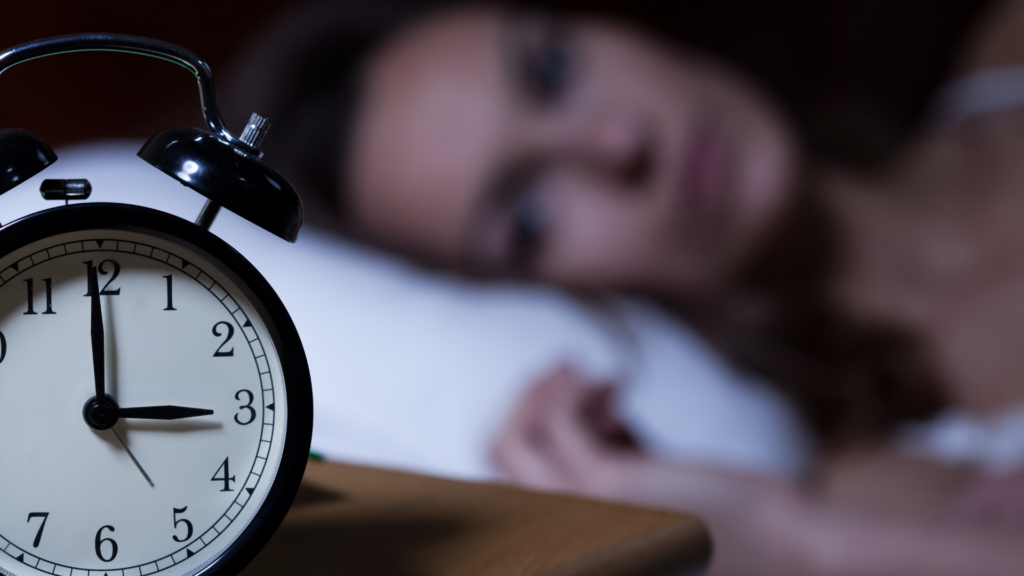Do you regularly get 7-9 hours of sleep a night? Most people in the US do not. In our society, there is a belief that you must be productive all the time. We are used to being busy all the time. You may be feeling the pressure to work more, achieve more, or have more. But for this to happen, something else must give. And often that something is sleep. Unfortunately, this leads to chronic amounts of sleep deprivation in the modern world. But in order to be healthy, you must improve your sleep.
Often sleep is the first thing to go

Many people treat sleep as expendable. They willingly sacrifice sleep without giving it much thought. It is far easier to go to bed later or wake up earlier than to admit that there isn’t enough time to do it all. Some even brag about their ability to “burn the candle at both ends” as if it were a symbol of tenacity or strength.
But this thinking is not only wrong but is making people chronically sick. Sleep is one of the foundations of being healthy. Good, quality sleep is not an option. Without it, the body cannot survive. And yet it is not uncommon for some people to claim they require less sleep than the average person. Those who make this claim are not being honest with themselves. And they do not recognize the damage they are ultimately doing to their body and their health
How we glorify sleep deprivation
There are a few successful celebrities and business leaders who regularly sleep less than 6 hours a night. They proudly attribute some level of their success to their short sleep times. Some even tell others that in order to experience business and financial success they should do the same.

Former President Barack Obama slept less than 5 hours or less a night while in the White House, due to the demands of running the country. Martha Stewart is known to get only 4 hours of sleep nightly. Former President Donald Trump claims that his ability to operate on a mere 3 hours of sleep gives him the competitive advantage necessary for success in the boardroom. Thomas Edison, regarded sleep as useless, “heritage from our cave days” and only indulged in 3-4 hours per night.
They’ve all accomplished great things. But the decision to forgo sleep carries a steep price, even for the elite. That price is health and longevity. People tend to applaud the ability to function without sleep. But the challenge is to change your mindset, particularly if you wish to rebuild and restore your health. Sleep should be valued, not considered an option.
Too little sleep damages health

We’re talking about the importance of sleep. But if you aren’t getting enough, it is important to understand just how that lack of sleep may be damaging your health. In the short term, sleep deprivation can affect judgment, mood, and the ability to learn and retain information. It also increases the risk of serious accidents and injury.
But the cumulative effect of chronic sleep deprivation is far more dangerous. Giving up sleep contributes to chronic health problems including obesity, diabetes, autoimmune disease, cardiovascular disease, digestive issues, and even early death.
What happens during sleep?
We tend to view sleep time as a period of inactivity. But the body is very active while we are sleeping. Each day, the brain takes in thousands of new bits of information. Consciously and subconsciously, the brain gathers data, learns new skills, and forms memories. When you go to sleep, your brain begins to organize, sort, file, or discard all that new data for easy access. If this clean-up process doesn’t happen, the disorganized brain becomes polluted with information and cellular trash. This trash leads to dysfunction in the brain. This cellular garbage usually manifests in the body as health problems such as immune function decline, increased cortisol levels, hormonal imbalances, blood sugar regulation issues, weight gain, and inflammation.
During high-quality sleep, growth hormone and testosterone levels increase. Each plays a critical role in muscle repair and neural growth. In addition, sleeping allows for restoration of the adrenal glands, detoxification of the liver, and the rebuilding of the immune system. When you don’t get enough sleep, the body begins to break down, and sleep is needed to build it back up.

Chronic sleep deprivation can lead to digestion and absorption issues resulting in malnutrition, adrenal fatigue, and malfunctions of the autonomic nervous system. These malfunctions include irregular heart-beat and compromised kidney and liver function. As a result, chronic pain, inflammation, headaches, trouble concentrating, weight gain, low libido, and mood swings have become “normal” in our sleep-deprived society.
How Much Sleep Do You Need?
For most adults 7-9 hours of sleep is ideal. Those recovering from an injury or illness, or under a great deal of physical or mental stress, might require slightly more. In general, sleeping fewer than 7 hours per night is associated with decreased alertness and increased risk for chronic disease. The more stress you have and the more work your body increases your need for sleep.
Circadian rhythms
A system of biological clocks controls the daily rhythms of the body. These are known as circadian rhythms. Circadian rhythms determine sleep patterns and energy levels throughout the day. They also influence hormone production, hunger, cell regeneration, and body temperature. The circadian rhythm is designed to be in tune with nature. This allows the body to be ready to wake and start the day at sunrise. Then the body is energized throughout the day and then winds down as the sun sets. This readies the body for a night of sleep and rejuvenation.
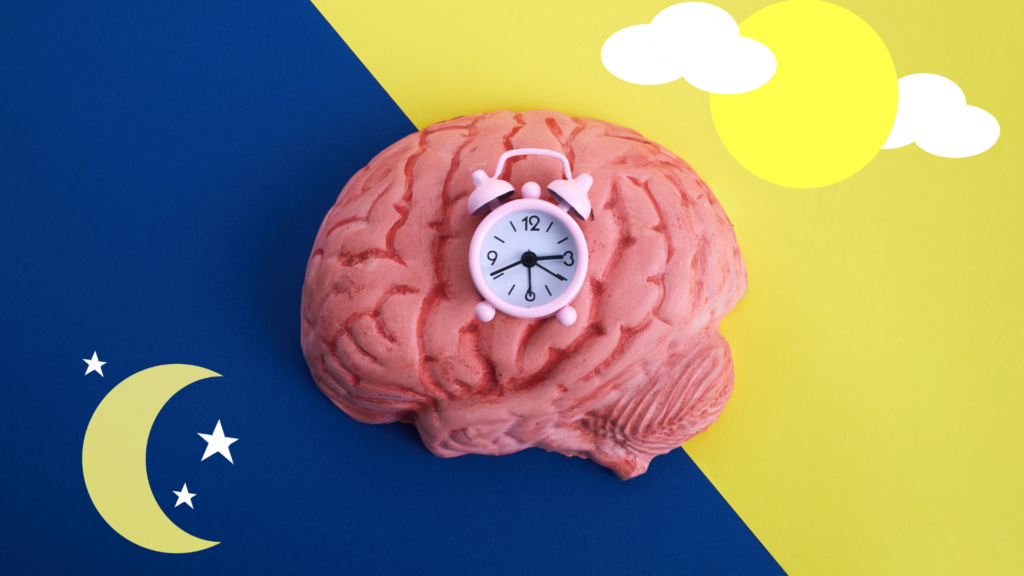
The “master” circadian clock that regulates the body’s daily cycle is found in the hypothalamus of the brain. Signals are sent throughout the body in response to dark and light. After sunset, there is less light. So, a signal is sent to the pineal gland in the brain prompting it to produce more melatonin, the sleep hormone.
Modern-day electrical lighting significantly disturbs the body’s inner clock by disrupting its natural rhythms. Each time light passes through the optic nerve to the pineal gland, it triggers a response. The light tells the brain to wake up and be alert, even in the evening when the body should be winding down.
Why testing is important
There are functional lab tests that can be done that can help uncover underlying dysfunctions that may be interfering with your sleep. Some possible causes might be a parasite or fungal infection, bacterial overgrowth, digestive issues, hormonal imbalances, inflammation, and/or chronic pain. It is important to see where in the body dysfunction is occurring so that you know where to send healing support to your body.
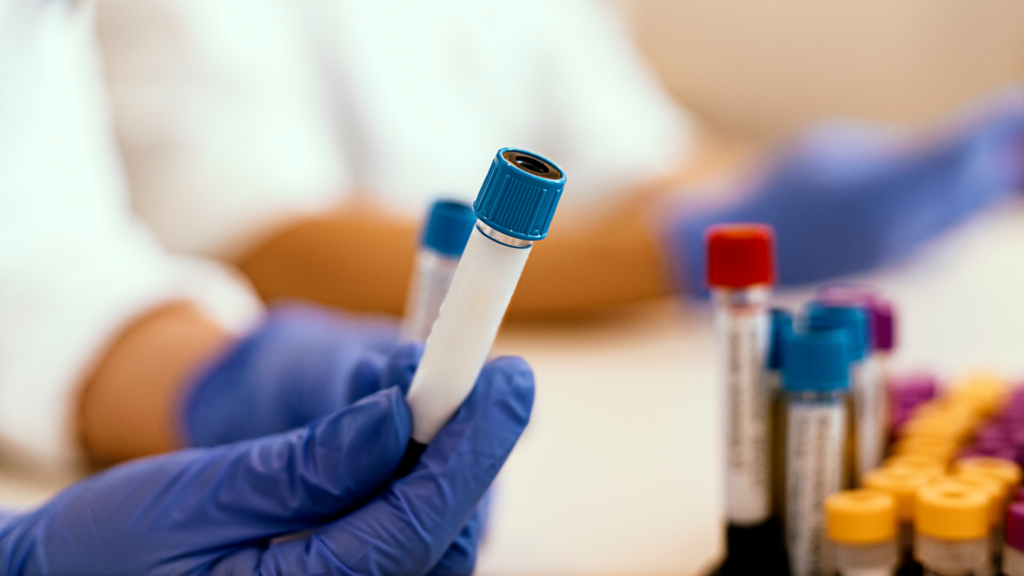
A simple saliva test can determine your current circadian rhythm and cortisol pattern, steroid hormone balance, and melatonin levels. The results help give some clues as to what might be preventing you from getting your best sleep. Testing is always the first line of defense so that you stop the pattern of trial and error…and help you get results that can help improve sleep so you start sleeping better again!
Tips to help improve your sleep
It is important to make sleep a priority. And if you’ve been having some sleep issues, there are some things you can do to help promote a good night’s sleep. Here are some simple tips to help you improve your sleep.
Get some sunlight

Between the hours of 6-8 am cortisol, the stress hormone is at its highest. This surge of morning cortisol is what turns on the brain and body and gets you moving in the morning. Morning sunlight exposure can maximize the waking effect of this cortisol release, helping to reset the circadian rhythm, naturally influencing cortisol levels to decline as the day progresses.
If possible, allow the sun to shine on your face for 20-30 minutes in the morning between 8-10 am. Being outside is best for this activity when possible. Sunlight through a windowpane may not have the same effect. And skip the sunglasses! They filter the sunlight too much and can prevent you from getting the health benefits of early morning sun exposure.
Physical activity

If you want to sleep better get off the couch and get active! Getting some physical activity in the morning when energy levels tend to be higher is a great idea. But even exercising in the afternoon can help you sleep better! You will enjoy an improved ability to focus and handle stress during the workday and will sleep better at night. Just be sure not to exercise too close to bedtime. This can actually give you too much energy and make getting to sleep more challenging.
Eating the right food for your body
In the morning, the hunger hormone ghrelin should be at its peak. Ghrelin stimulates appetite encouraging you to eat in the morning. Listening to your body’s cues to keep hunger and satiety hormones in balance is important. Doing this helps to reset your circadian clock and can help you start to get your hormones in balance.

Some feel better when they wait to eat until later in the day. But for many, skipping breakfast can further throw off the cycle. This can result in cravings and increased appetite throughout the day. Be sure that you choose foods that are right for your metabolic type. Eating for your metabolic type can help your body to maintain balance and reduce stress levels.
Skip the caffeine

Are you a coffee fan? To avoid disruptions to your sleep, limit your caffeine consumption to the morning hours. And limit consumption of oversized caffeinated drinks, which contain unhealthy levels of caffeine. Limiting morning coffee to no more than two 8 oz. servings is ideal. Remember that the later in the day you drink those caffeinated beverages, the greater the chance that it may impact your sleep. You can begin to improve your sleep by being more aware of when you are drinking caffeine and limiting it.
Eat dinner earlier
Eating a meal with foods that are best for your metabolic type before 7 pm will keep you feeling satisfied until bedtime. After sunset, the hormone leptin is released from the body’s fat stores. Leptin is the opposite of ghrelin; instead of stimulating appetite, it promotes feelings of satiety. If your circadian rhythm is working properly and leptin can do its job, this hormone can shut down your appetite and control any late-night food cravings. If your hormones are imbalanced it can result in excessive eating, uncontrollable hunger, and poor sleep. This can lead to a vicious cycle of late-night food cravings and binge eating which can further disrupt your sleep. Opting to eat a bit earlier can keep those cravings away, which can help improve your sleep.
Have a bed-time ritual
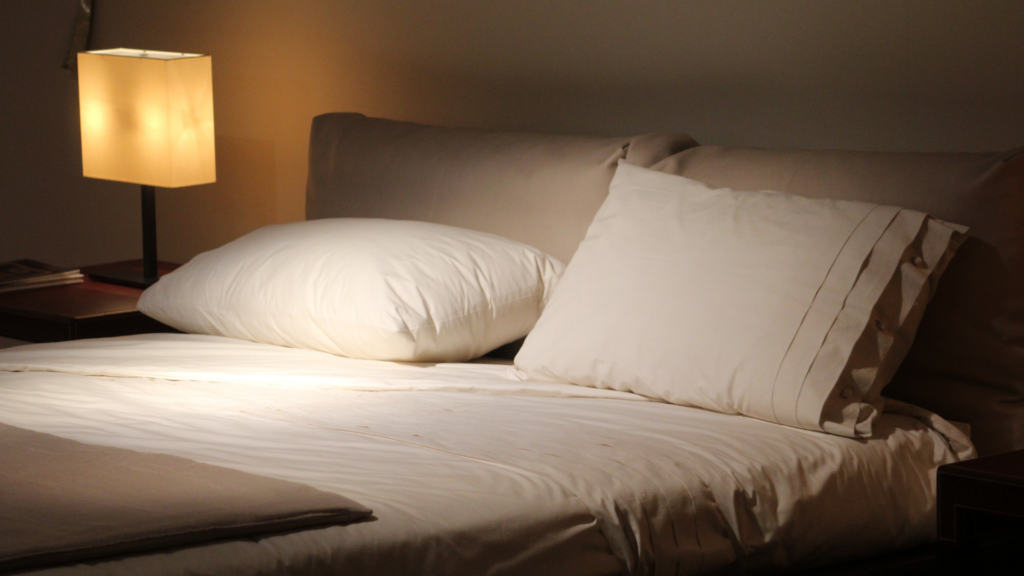
What is your nighttime ritual now? To promote good sleep start winding down about 1-2 hours before bed. Spend some time journaling, meditating, or creating a to-do list for the next day. This will allow for a clear mind while drifting off to sleep. Shut off your television and power down computers, cell phones, and other electronics at least an hour before you go to bed. If you enjoy a warm bath, this is the perfect time to indulge in one! When you get out of the bath your body temperature will begin to slowly decrease. This can help you more easily fall asleep.
Be sure to wear comfortable, loose-fitting pajamas. It is important to be comfortable. Dim the lights in your house and curl up on the couch with a bedtime story. Choose a book that will help quiet the mind. Steer clear of books that relate to jobs, mysteries, or anything too exciting which could be stimulating. And choose a physical book instead of a screen, which can mess with your sleep.
Keep tech out of the bedroom

Ideally, the bedroom should be reserved for two things…sleeping and sex. The television should be kept in the living room, and cell phones, tablets, and laptops should be kept and charged out of the bedroom, as well. The lights and noises from these devices stimulate the brain and compromise sleep. Leaving the television and your tech gadgets out of the bedroom is a great way to improve your sleep!
Keep the light out
Light suppresses melatonin production. The darker the room, the easier it will be for the body to fall asleep. Even in the middle of the night, light can seep in from street lighting, a digital clock, or a full moon. Consider investing in some good curtains, blackout shades, or indoor blinds that don’t let any light in. If you can’t prevent light from entering your room, you can opt to use a sleep mask. A good sleep mask can effectively block the light so you can improve your sleep.
Cool your room down
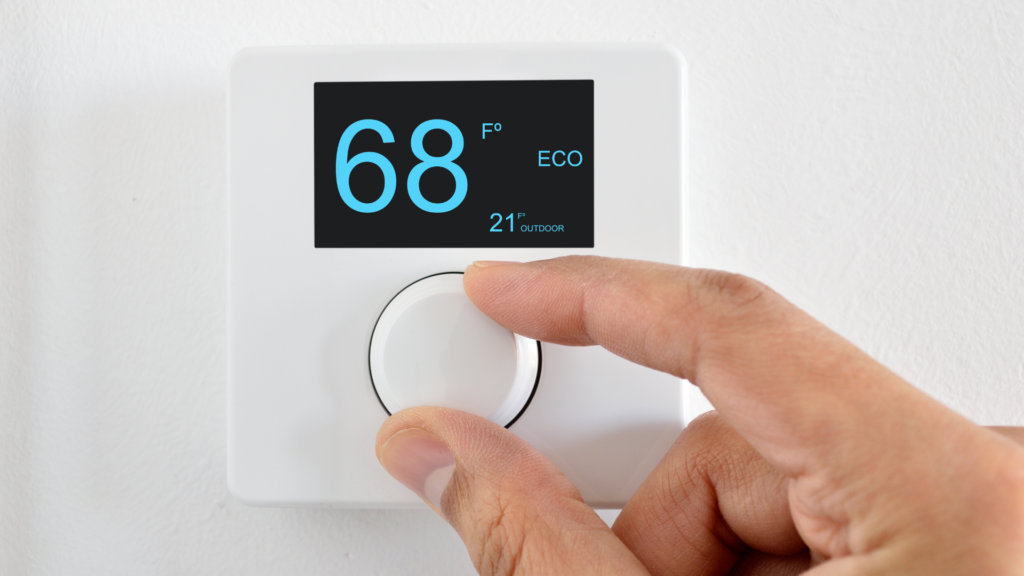
What temperature do you keep your house at while you’re sleeping? Studies have shown that the best temperature for sleep is 60 to 68 degrees Fahrenheit. Temperatures that fall too far below or above this range can lead to restlessness and prevent optimal sleep. The number you choose on the thermostat is unique to each person. One person may sleep well when their house is at 60 degrees, but you may not. Take the time and find out what temperature works best for you.
Remember, missing out on sleep ages your body more quickly and ultimately harms your health. So, it’s important to act right away to ensure sweet dreams in your future. Taking time to improve your sleep is a powerful way to support your body and its ability to heal itself.
If you are interested in optimizing your sleep but feel like you need some guidance, contact us to see if working with us is the right fit for you.

